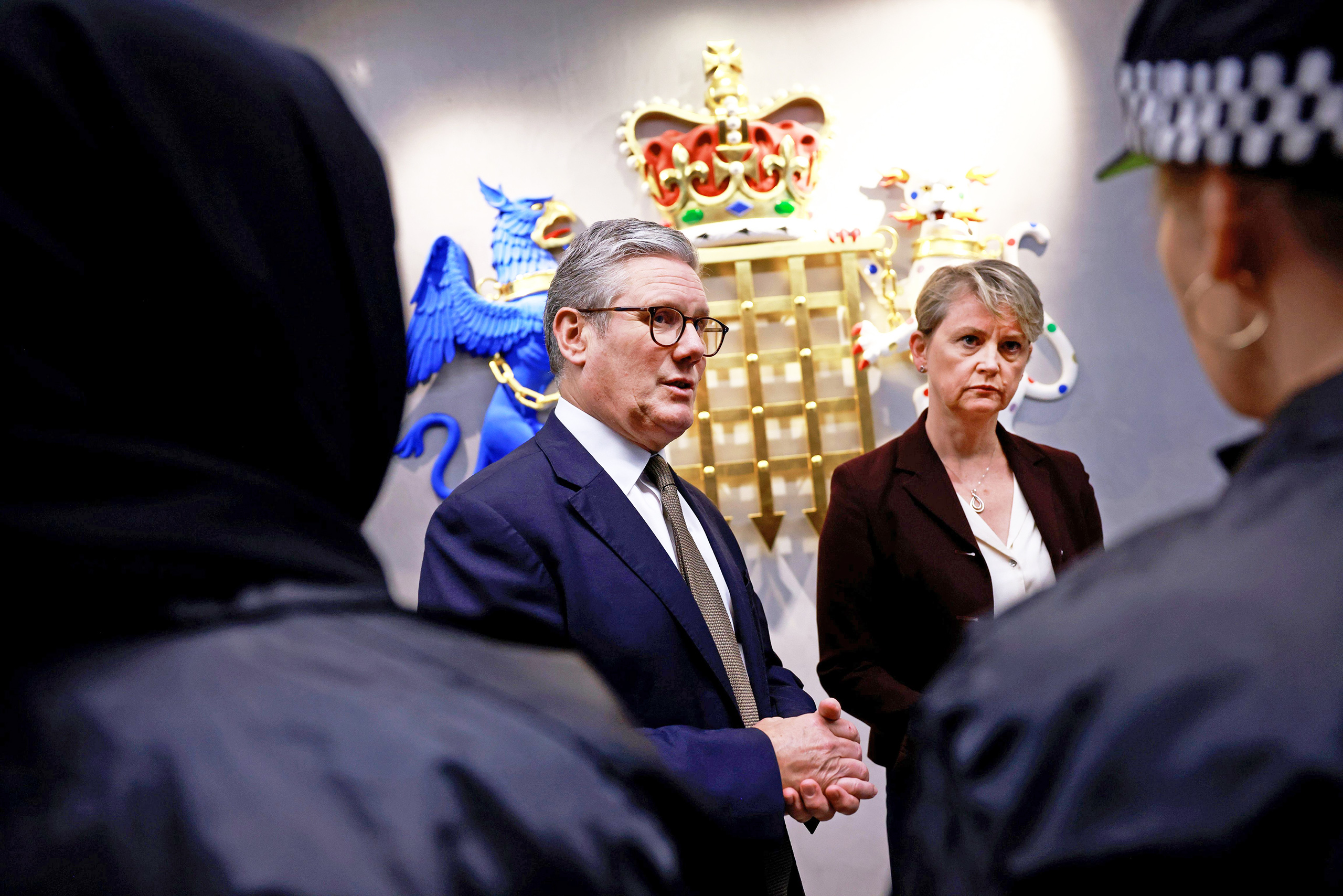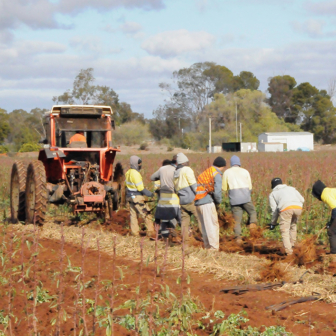On Monday this week Britain’s Home Office released blurry footage of immigration officials in hi-vis vests escorting men from a bus to a plane. It was accompanied by a statement celebrating the removal of 19,000 people from Britain since the government took office in July. The Home Office shared the “inner working” of removals, it says, “to provide further understanding of this important work.”
On the same day the Home Office announced that a record number of arrests in January after its “blitz on illegal working” had targeted nail bars, car washes, convenience stores and restaurants.
Widely picked up by the media, the two releases were timed to coincide with the second reading debate on the Border Security, Asylum and Immigration Bill. Keir Starmer’s Labour government hopes the legislation will convince the public that it has the borders under control.
It has reason to be worried. Candidates from Nigel Farage’s Reform UK party ran a close second to Labour in many electorates at last May’s election. Now two polls by separate research companies put Reform ahead of both Labour and the Conservatives for the first time. The anti-immigration party claims to have amassed more than 200,000 members and is aiming to eclipse Labour’s total of 309,000 to become the country’s biggest party.
In an attempt to counter the Reform’s surge, Labour has resorted to spruiking the government’s recent border control achievements in unbranded social media posts coloured in the turquoise hue more usually associated with Farage’s party. The border security bill is Labour’s alternative to its predecessor Conservative government’s failed plan to send asylum seekers to Rwanda for processing, a scheme inspired in part by Australia’s offshore detention regime. After four years and £700 million only four “volunteers” ended up in the central African country.
The scheme was stymied by a Supreme Court ruling that refugees would be at risk of being returned to places of persecution. Before losing office, the Tories tried to get around that decision by signing a treaty with Rwanda, but even if it had gone ahead the plan wouldn’t necessarily have deterred asylum seekers from crossing the English Channel in small boats. The only certainty was that the astronomical expense would have mounted. The UK’s National Audit Office calculated the cost of sending an initial 300 asylum seekers to Rwanda at £569 million (A$1.13 billion) or about £1.9 million per person.
According to Labour home secretary Yvette Cooper, scrapping the doomed program has enabled the government to redeploy 1000 staff to beef up immigration enforcement and removals. She says the new border security bill will give the authorities “counterterror-style powers… to go after the dangerous criminal gangs that undermine our border security.” Echoing John Howard, she declared that “it should be governments, not gangs, who decide who enters our country.”
Also this week, separate from the border security bill, the Home Office announced that anyone who enters Britain illegally after a dangerous journey will be refused citizenship. The measure, clearly targeted at deterring Channel-crossers, will apply retrospectively to people already living in the UK, including those granted protection as refugees.
Not all Labour MPs are enamoured of the government’s attempt to bolster its image as tough on borders. Stella Creasy, MP for Walthamstow, criticised the new citizenship approach for guaranteeing that refugees will forever remain second-class citizens. Backbencher Clive Lewis argued that releasing the deportation footage was a tactical mistake, since nothing the government does will ever be “harsh or cruel enough for those who are utilising this for political gain.” He said that “mainstreaming racism” gives groups like Reform “permission to go further and further using more racist rhetoric.”
The Home Office claimed its blitz on “illegal working” is vital to restoring order to the immigration system because it undermines the promise of “false jobs” used by smuggling gangs to sell spaces on boats. This conforms to the view, promulgated by both Labour and the Tories, that people risking the sea crossing to England are “economic migrants” rather than refugees.
Bearing in mind that these are not mutually exclusive categories — what refugee doesn’t also want paid work? — analysis by the Refugee Council shows that Afghanistan, Iran, Syria, Eritrea, Sudan and Iraq made up six of the top seven nationalities arriving on small boats — all countries noted for human rights abuses and/or violent conflict. (The other was Vietnam, hardly an upholder of liberal freedoms.) The council notes that just over half the asylum applications processed in Britain in the year to September 2024 were granted protection in the first instance, and almost half of all rejections were subsequently overturned on appeal.
At least sixty-nine people died attempting the channel crossing in 2024, making it the deadliest year on record. This alone would suggest that people who put their lives on the line to get on boats are driven by desperation and won’t be easily deterred by stepped up removals or crackdowns on undocumented workers.
The problem for Labour is this: no matter how many nail salons and convenience stores it raids, no matter how many undocumented workers it sends home, no matter how efficiently it processes asylum applications and removes people who are found not to be refugees, the popular gauge of the government’s border control “success” will always be measured in the number arriving in small boats without authorisation. While Labour has deported 19,000 people since it took office, more than 23,000 people crossed the English Channel in roughly the same period
Labour has swapped one three-word slogan — “stop the boats” — for another — “smash the gangs.” But both approaches amount to much the same thing — an effort to secure the border through tighter policing and harsher penalties. Australia, with its long maritime approaches, was able to stop the boats by forcing them back to Indonesia. But stepped-up border security rarely deters unauthorised arrivals, and instead forces people deeper into the arms of smugglers and onto even more dangerous routes.
As Daniel Trilling, author of Lights in the Distance: Exile and Refuge at the Borders of Europe, told the Guardian, increasingly harsh measures have helped to shape the current situation. “One of the big reasons for the increase in small boat crossings was the huge amount of money poured into making access to ferries and lorries more difficult,” he said. “That pushed people to take more desperate measures. The more securitised the route, the more it has to be controlled by middle men.”
At the end of March, the Starmer government will host a “landmark” Border Security Summit at the historic Lancaster House in London, with delegates from more than forty countries, Australian officials no doubt among them. Whether the talks will be a “watershed moment in the UK’s fight against Organised Immigration Crime” or just another occasion to display tough-on-borders rhetoric remains to be seen. •




